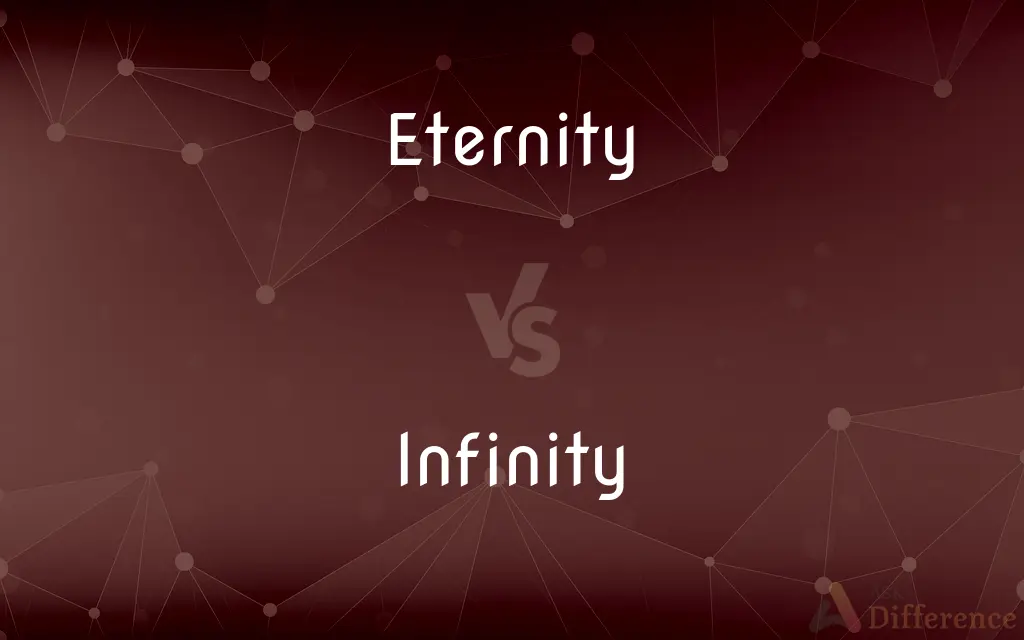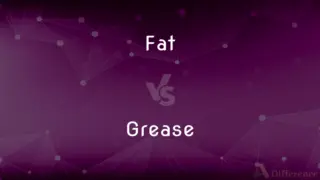Eternity vs. Infinity — What's the Difference?
Edited by Tayyaba Rehman — By Fiza Rafique — Updated on September 21, 2023
"Eternity" refers to an endless or infinite duration of time, often in a spiritual or philosophical context. "Infinity," on the other hand, is a mathematical or scientific concept signifying a quantity without bound or end.

Difference Between Eternity and Infinity
Table of Contents
ADVERTISEMENT
Key Differences
"Eternity" is a concept that primarily refers to an unending duration of time. It is often used in spiritual or religious contexts to describe an afterlife or the nature of the divine. "Infinity" is a broader concept that represents an unbounded or limitless quantity, which can be applied to time, space, numbers, and other dimensions.
While "eternity" is specifically focused on the concept of time, "infinity" is not restricted to time alone. In mathematics, for example, infinity represents an unattainable upper or lower bound. In physics, it might refer to the infinite expanse of the universe.
"Eternity" tends to have emotional or existential connotations. Phrases like "waiting for an eternity" or "love for all eternity" showcase this emotional aspect. "Infinity," by contrast, is often used in a more neutral, factual manner. For instance, mathematicians might speak of a sequence approaching infinity.
In language usage, "eternity" usually functions as a noun, but "infinity" can act as both a noun and an adjective. You might say, "The universe is infinite," using "infinite" as an adjective. However, "eternal" can also be used as an adjective derived from "eternity."
Comparison Chart
Primary Context
Spiritual, Philosophical
Mathematical, Scientific
ADVERTISEMENT
Applies To
Time
Time, Space, Numbers, etc.
Emotional Connotation
Often present
Usually neutral
Part of Speech
Mainly a noun
Noun and adjective
Typical Usage
Existential discussions, religion
Academic fields, factual discussions
Compare with Definitions
Eternity
A very long or seemingly endless period.
Waiting for the bus felt like an eternity.
Infinity
The state or quality of being infinite.
The infinity of the universe is a topic of scientific debate.
Eternity
Forever, without end.
Their love was meant to last for eternity.
Infinity
Unboundedness in a particular dimension, such as space or time.
Black holes challenge our understanding of spatial infinity.
Eternity
An endless or infinite duration of time.
The concept of eternity fascinates philosophers and theologians.
Infinity
A quantity without bound or end.
In mathematics, infinity is denoted by the symbol ∞.
Eternity
Timelessness, especially in a spiritual context.
Heaven is often described as a place of eternity.
Infinity
Limitlessness or immeasurability.
The artist tried to capture the infinity of human emotions.
Eternity
Eternity, in common parlance, means infinite time that never ends (or the quality, condition or fact of being eternal). Classical philosophy, however, defines eternity as what exists outside time - as in describing supernatural beings and forces, whereas sempiternity corresponds to the infinitely temporal, non-metaphoric definitions, as recited in requiem prayers for the dead.
Infinity
An extremely large or endless number or amount.
There seemed to be an infinity of possibilities.
Eternity
Infinite or unending time
This state of affairs has lasted for all eternity
Their love was sealed for eternity
Infinity
Infinity is that which is boundless or endless, or something that is larger than any real or natural number. It is often denoted by the infinity symbol shown here.
Eternity
Time without beginning or end; infinite time.
Infinity
The state or quality of being infinite
The infinity of space
Eternity
The state or quality of being eternal.
Infinity
A number greater than any assignable quantity or countable number (symbol ∞)
The transmission approaches 100% as the frequency tends to infinity
Eternity
The timeless state following death.
Infinity
The quality or condition of being infinite.
Eternity
The afterlife; immortality.
Infinity
Unbounded space, time, or quantity.
Eternity
A very long or seemingly endless time
Waited in the dentist's office for an eternity.
Infinity
An indefinitely large number or amount.
Eternity
(uncountable) Existence without end, infinite time.
Infinity
(Mathematics) The limit that a function is said to approach at x = a when (x) is larger than any preassigned number for all x sufficiently near a.
Eternity
Existence outside of time.
Infinity
A range in relation to an optical system, such as a camera lens, representing distances great enough that light rays reflected from objects within the range may be regarded as parallel.
Eternity
(countable) A period of time which extends infinitely far into the future.
Infinity
A distance setting, as on a camera, beyond which the entire field is in focus.
Eternity
(metaphysical) The remainder of time that elapses after death.
Infinity
(uncountable) endlessness, unlimitedness, absence of a beginning, end or limits to size.
Eternity
A comparatively long time.
It's been an eternity since we last saw each other.
Infinity
A number that has an infinite numerical value that cannot be counted.
Eternity
Infinite duration, without beginning in the past or end in the future; also, duration without end in the future; endless time.
The high and lofty One, that inhabiteth eternity.
Infinity
An idealised point which is said to be approached by sequences of values whose magnitudes increase without bound.
Eternity
Condition which begins at death; immortality.
Thou know'st 't is common; all that lives must die,Passing through nature to eternity.
Infinity
(uncountable) A number which is very large compared to some characteristic number. For example, in optics, an object which is much further away than the focal length of a lens is said to be "at infinity", as the distance of the image from the lens varies very little as the distance increases further.
Eternity
Time without end
Infinity
The symbol ∞. Category:en:Infinity
Eternity
A state of eternal existence believed in some religions to characterize the afterlife
Infinity
Unlimited extent of time, space, or quantity; eternity; boundlessness; immensity.
There can not be more infinities than one; for one of them would limit the other.
Eternity
A seemingly endless time interval (waiting)
Infinity
Unlimited capacity, energy, excellence, or knowledge; as, the infinity of God and his perfections.
Eternity
Perpetual or unending existence.
The soul is believed to live for all eternity in some religious beliefs.
Infinity
Endless or indefinite number; great multitude; as an infinity of beauties.
Infinity
A quantity greater than any assignable quantity of the same kind.
Infinity
That part of a line, or of a plane, or of space, which is infinitely distant. In modern geometry, parallel lines or planes are sometimes treated as lines or planes meeting at infinity.
Infinity
Time without end
Common Curiosities
Is "eternity" a religious term?
"Eternity" is often used in religious or spiritual contexts but is not exclusively a religious term.
Is "infinity" a mathematical term?
"Infinity" is commonly used in mathematics and science but is not limited to these fields.
What does "eternity" mean?
"Eternity" refers to an endless or infinite duration of time, often in a spiritual context.
Do both terms suggest endlessness?
Yes, both "eternity" and "infinity" suggest a concept of endlessness.
Can "eternity" refer to space?
"Eternity" primarily refers to time and is rarely used to describe spatial concepts.
Is "eternal" derived from "eternity"?
Yes, "eternal" is an adjective derived from the noun "eternity."
What does "infinity" mean?
"Infinity" represents an unbounded or limitless quantity, applicable to various dimensions including time, space, and numbers.
Can "infinity" refer to time?
Yes, "infinity" can refer to an endless duration of time among other things.
Is "eternity" used as an adjective?
The term "eternity" itself is a noun, but "eternal" serves as its adjective form.
Is "infinite" derived from "infinity"?
Yes, "infinite" is an adjective derived from the noun "infinity."
Can "infinity" be measured?
"Infinity" is considered an unattainable upper or lower bound and is not measurable.
How is "eternity" commonly used?
"Eternity" is often used in existential discussions or to describe a feeling of endlessness.
Can "eternity" be measured?
"Eternity" is considered immeasurable, as it signifies an endless duration.
Is "infinity" used as an adjective?
"Infinity" is primarily a noun, but "infinite" serves as its adjective form.
How is "infinity" commonly used?
"Infinity" is often used in academic and factual discussions, particularly in mathematics and science.
Share Your Discovery

Previous Comparison
Garment vs. Clothes
Next Comparison
Fat vs. GreaseAuthor Spotlight
Written by
Fiza RafiqueFiza Rafique is a skilled content writer at AskDifference.com, where she meticulously refines and enhances written pieces. Drawing from her vast editorial expertise, Fiza ensures clarity, accuracy, and precision in every article. Passionate about language, she continually seeks to elevate the quality of content for readers worldwide.
Edited by
Tayyaba RehmanTayyaba Rehman is a distinguished writer, currently serving as a primary contributor to askdifference.com. As a researcher in semantics and etymology, Tayyaba's passion for the complexity of languages and their distinctions has found a perfect home on the platform. Tayyaba delves into the intricacies of language, distinguishing between commonly confused words and phrases, thereby providing clarity for readers worldwide.















































